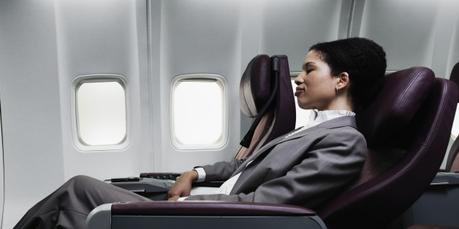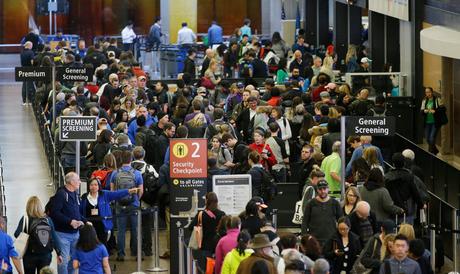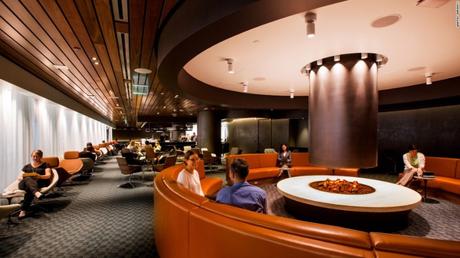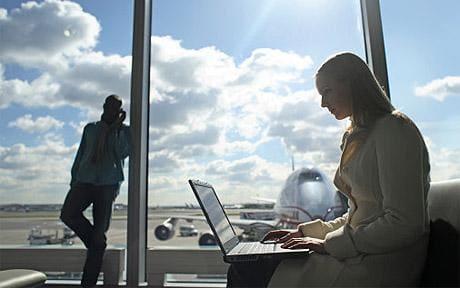
Top Tips from Frequent Business Travelers
Business travel has its own unique challenges. Unlike traveling for vacation where you can go with the flow, you have responsibilities and commitments to keep. You need to be there on time, show up at your meetings looking well-groomed, get enough rest to be on the top of your game, and find the time to get some much-needed work done. One bad experience, missed connection, or dirty hotel room can throw the whole thing off.
How do the pros do it? We talked to people who log thousands, and sometimes hundreds of thousands, of miles in business travel over the course of the year. We gathered their expert tips so you can navigate your next business trip like you fly a million miles a year.
Fly at the Right TimeFlying on the right day of the week and the right time of day can help you avoid serious headaches and long lines at security that will start your business trip off on the wrong foot. "To avoid crowds, traffic, and delays, don't fly on a Monday or a Friday," said Denise Foley, who travels up to 80 percent of the time for her job as a visual merchandising professional. "Tuesdays through Thursdays are much less busy at the airport, and you may also save money on airfare as well."

However, occasionally you will need to be in the office in another city for an early Monday morning meeting. In these cases, ask whoever handles travel arrangements at your company if they can book your flight and hotel for the Sunday before your meeting. If you are an exempt employee, meaning you're not eligible for overtime, they may agree. Although you'll be flying on your own time, it's worth it to lower your stress level and have time to prepare for your meeting.
As for time of day, Roman Shteyn, CEO of RewardExpert, suggests an early flight. "The best time to fly is early in the morning, before 9 a.m.," he said. "Airports are typically less crowded and it's also less likely that you'll experience delays due to heavy air traffic, which increases throughout the day."
Our experts agreed that traveling between 11 a.m. and 4 p.m. should be avoided, especially on Mondays. These times are the most prone to congestion.
Survive and Thrive at the AirportThe modern-day airport sometimes feels like a battleground, with a maze of obstacles, crowds and sub-standard dining options you'll have to navigate before reaching your destination - but not for our experts. Their top tip: Find an airport lounge.
Airlines operate lounges as a premium service for passengers, usually those flying business or first class and people with frequent flyer miles. You'll find more comfortable seating, quieter working areas, stronger Wi-Fi access, and better access to customer service representatives. Airlines will have one or more lounges in each of their major hub cities.
If you're not a member of an elite program that gives you access to these lounges, there are certain workarounds. For those without program membership, day passes to lounges typically cost around $50 for 24-hour access. It can be worth the expense if you have a long layover, want to get some work done, or need to get some shut-eye in a quiet environment.
Also...there's an app for that. "I use the app LoungeBuddy to tell me which lounges are available and see pictures and reviews from other travelers," advised Lee Huffman of BaldThoughts.com. "The app will also tell me whether there is a charge to enter or if I have access based on elite status, credit card benefits or lounge memberships."

If you're traveling internationally for business, many airport lounges in Europe are a step above what you'll find in the United States. "In Frankfurt or London, the lounges have showers, quiet rooms, and more robust food selection," said Aaron Udler, President of Office Pro, Inc. "Nothing is better than taking a shower during an international layover. The facilities in the United and Lufthansa lounges are pretty nice for taking a shower, and they include towels, slippers, soaps, and shampoos!"
When you're not able to access a lounge at the airport, you still have a few options. Find a nearby gate where another flight won't be boarding for a few hours; it will be relatively empty and quiet since others will not have arrived yet. You can usually work in peace without being distracted. You'll also usually find the strongest Wi-Fi signal near that check-in desk at the gate, so camp out there if you need to send emails or get online.

If you want to catch up on some sleep while flying, seat location is the single-most important factor that you have control over. Set a reminder for yourself to check in online 24 hours in advance so you can be among the first to select your seat preference. Your preferences may vary, as did those of our experts.
Shetyn prefers an aisle seat. "Aisle seats are my preference as they easily allow me to stand up and walk around without disturbing other travelers," he said. "Plus they offer just a little bit more of that valuable legroom when I sleep!"
However, Greg Geronemus, co-CEO of smarTours, likes a window seat. It allows him to rest his head on the wall near the window, which is easier than trying to fall asleep on a neck pillow while basically sitting upright. He uses either a blanket or a pillow as a cushion. A window seat also offers some measure of control over light exposure, since you can open and close the window whenever you want.
Geronemus has several other tips for sleeping on a plane:
- Wear comfortable clothing. Falling asleep on an airplane is all about making yourself feel as at-home as possible.
- Don't cross your legs. When you cross your legs, you can restrict blood flow and increase your chances of a blood clot or unnecessary pain when you awake.
- Recline your seat. Reclining your chair will ease some of the pressure on your lower spine. With less pressure on your back, it'll be easier to fall asleep.
- Skip the alcohol. Drinking won't help you sleep soundly and may dehydrate you. Your tolerance may also be different because of the cabin pressure.
- Eat light. Overeating or indulging in fatty foods may upset your stomach and make it harder to sleep. A grilled chicken salad typically does the trick.
- Keep your seatbelt visible. The key to avoiding interrupted sleep is to buckle your seatbelt over your blanket or sweater, not under it. That way, the flight attendant can see that you're buckled up and will not wake you if there is turbulence.
While the criteria for the perfect hotel experience will vary from person to person, most seasoned business travelers tick off many of the same "must-haves" in their ideal hotel. Most want something that gives a bit of the same feeling as their home, with separate areas for work and sleeping.
"My favorite hotels are places that have a living or couch area, along with a desk in a separate area away from the beds," said Robin O'Neal Smith, a frequent business traveler and founder of Be Social, Get Success. A few of the other common points of advice from frequent business travelers included getting a room on a non-smoking floor, not just a non-smoking room. You'll also want to make sure the hotel has dependable Wi-Fi, a gym with up-to-date machines, a restaurant on the premises that caters to your dietary needs, and late check-in and check-out.
To get the perfect night's sleep at your hotel, Greg Geronemus suggests following these tips:
- Be aware of your room location. Request a room as far away from the elevator as possible. You don't want to hear the elevator bell, doors and foot traffic all night.
- Get a room on a high floor. It's generally less noisy on higher floors, just be careful that you're not right below a rooftop bar.
- Make sure the air conditioner works. Check as soon as you arrive - don't wait until you're trying to fall asleep to find out that your AC doesn't work.
- Check the voltage. If you live with a condition such as sleep apnea and use a CPAP machine, find out if you'll need a voltage adapter to use your machine. This is especially relevant if you're traveling abroad.
When Aaron Udler travels domestically, he goes off the beaten path for his accommodations. "I have started staying at an places listed on airbnb, but only if I can get a whole apartment or house to myself," he said. "It's usually less expensive, roomier, and I truly get to experience the local community." Internationally, he prefers to stay at U.S.-branded hotels since their quality standards are similar the world over. In countries or cities that don't have these options, he uses TripAdvisor to find the nicer hotels in that locality.
Stay Wrinkle Free and Look Your Best at the Big MeetingIf you're going straight from the plane to the office, wearing your work clothes while you travel may be unavoidable. If you have a few minutes before you jump in a cab to leave the airport, you may be able to pack your clothes and do a quick change in an airport lounge or bathroom. This strategy can help to keep you wrinkle free.
However, if you do have time between your flight and your meeting, you should revise your strategy. Daisy Jing, travel veteran and founder of Banish skin care products, prioritizes comfort and versatility when she flies. "I usually wear athletic or athleisure wear because it's comfortable, easy to wash, and easy to move in," Jing said. "I have these running shorts (with underwear attached) I purchased for $5. I love that they are so light and small. They are perfect for either sleepwear, running around, or working out. You can also wash them in the shower, which is what I do when I travel."
Lou Altman, CEO of Globafone, doesn't wear meeting clothes on the plane whenever possible. If you ask nicely (and you're flying first class), the flight staff can be a big help. "Ask the flight staff to hang your clothes - you just have to ask politely and I've never been turned down," he advises. "I often hit a gym when I land and change there, or I simply change in the bathroom at the airport."
Remember that your hotel has services as well, and can press or dry clean your clothes fairly quickly. Pack lightly and spend $20 to $30 for hotel laundry service. This will help you travel with a carry-on only, and keeps you nice and fresh throughout the trip.
When you open your bag to an onslaught of wrinkled clothes, there's always the hotel iron. Be careful using it though, as it sometimes creates more problems than it solves. Hotel irons are not always the highest quality, and previous guests may not have used it correctly. You may be transferring fuzz and lint from the iron to your work clothes. Also, never iron a suit jacket - it should only be pressed or steamed.
If you decide to skip the iron, hang your clothes along the shower bar in the hotel bathroom and turn the shower on as hot as it will go. Close the bathroom door and wait 10 minutes for the steam to release the wrinkles from your clothes. It's a trick that many of our seasoned business travelers swear by.
Ask and You Shall Receive: Little-Known PerksYour mantra when you travel should be "always ask, it can't hurt." If you ask hotel staff for extra services, sometimes you'll get them.
- Always ask for a complementary upgrade to a bigger room, or even the "executive lounge." Often times, employees will say "ok, but just this one time."
- Request basic amenities, like extra towels and pillows, that could make your stay more comfortable.
- Inquire about free parking or free breakfast.
- If the property asks for you to pay for Wi-Fi, ask the person at the front desk to remove the charge from your bill as you check out.
- Certain credit cards offer a complimentary fourth night stay at hotels, just be sure to book through their network.
- Ask for access to the hotel lounge, even if you are not on the executive floor. You may also be able to get access to the lounge for a nominal fee, which may be worth it. You will typically get a better breakfast, evening hors d'oeuvres and facilities where you can hold meetings.
When you're traveling for business frequently, you start to learn the ins and outs pretty quickly. Start to incorporate these tips, and come up with a list of your own to make your next trip comfortable and productive.

